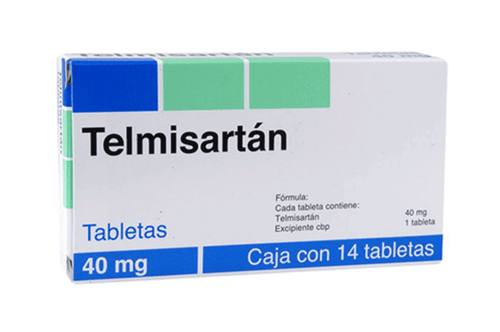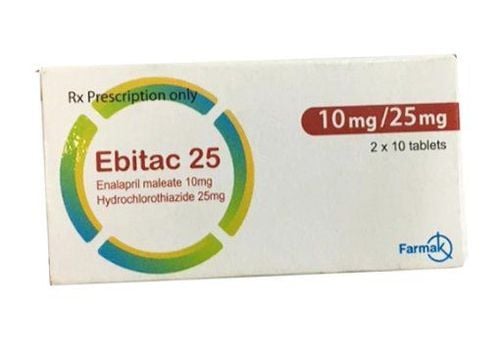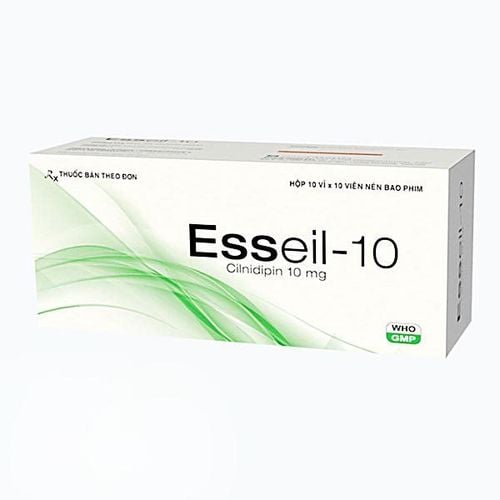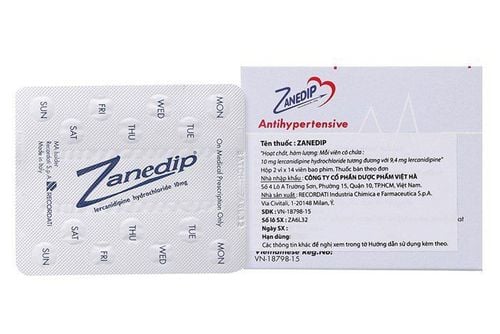This is an automatically translated article.
Angitel H belongs to the group of cardiovascular drugs, made in the form of pellets, packing box of 3 blisters x 10 tablets. Angitel H is useful in the treatment of essential hypertension in adults but is not initially indicated for the treatment of this condition. To use Ceftarol safely and effectively, you should consult a pharmacist or specialist.
1. Ingredients of Angitel H
Ingredients in Angitel H include:
Telmisartan 40mg; Hydrochlorothiazide 12.5mg. Telmisartan:
Telmisartan antagonizes angiotensin II with a strong affinity for the AT1 receptor binding site - responsible for all known actions of angiotensin II and does not have any agonist activity of telmisartan at AT1 receptor. This bond is very strong and lasting. Telmisartan has no affinity for other receptors, and the role and consequences of excessive stimulation of these receptors are unknown when angiotensin II levels are increased by telmisartan. Telmisartan reduces the amount of aldosterone in the blood. Telmisartan does not inhibit plasma renin, does not block ion channels and does not inhibit angiotensin converting enzyme (kinase II). Therefore, telmisartan is free of the side effects caused by bradykinin. With a dose of 80mg, Telmisartan will almost completely inhibit the antihypertensive effect of Angiotensin II. This inhibitory effect persists for 24 hours and is effective up to the 48th hour. After the first dose of the active ingredient Telmisartan, the antihypertensive effect is gradual and pronounced over 3 hours. The antihypertensive effect will reach its maximum after 4 weeks of treatment and be maintained during long-term treatment. Hydrochlorothiazide:
This is a Thiazide diuretic, which increases the diuresis of sodium chloride and accompanying water. The excretion of other electrolytes is also increased, while calcium is decreased. Hydrochlorothiazide also reduces the activity of carbonic anhydrase, so it increases bicarbonate excretion and does not significantly change urine pH. Hydrochlorothiazide has antihypertensive effect. During drug administration, the antihypertensive effect depends on the decrease in peripheral resistance, through the gradual adaptation of blood vessels to the decrease in sodium ion concentration. Therefore, the antihypertensive effect of Hydrochlorothiazide will occur slowly after 1-2 weeks, while the diuretic effect occurs rapidly after a few hours.
2. Indications for use of Angitel H
Angitel H is a prescription medicine that is used to treat the following conditions:
Angitel H is used to treat essential hypertension in adults. However, Angitel H is not initially indicated for the treatment of hypertension. When necessary, Angitel H can be combined with another antihypertensive drug.
3. Dosage - How to take Angitel H
Reference dose of Angitel H:
Dosage in adults:
Take 1 Angitel H tablet per day. If necessary, the dose of Angitel H can be increased to 160 mg Telmisartan and 25 mg Hydrochlorothiazide (suitable combination or alone). Before increasing the dose of Angitel H, it should be noted that the maximum antihypertensive effect is usually achieved after 4 to 8 weeks of treatment.
Dosage for patients with renal impairment:
Angitel H is not indicated in patients with severe renal impairment (creatinine clearance ≤ 30ml/min). Experience with Angitel H is still limited in patients with moderate to mild renal impairment, but no side effects have been shown, so no dose adjustment is required. During the use of Angitel H, the patient should be periodically monitored for renal function. Dosage for patients with hepatic impairment:
In patients with mild or moderate hepatic impairment, the dose of Angitel H should not exceed 1⁄2 tablets (Telmisartan 40mg/ Hydrochlorothiazide 12.5mg) once daily. Angitel H is contraindicated in patients with severe hepatic impairment. Elderly patients:
No dose adjustment of Angitel H is required. Children under 18 years of age:
Safety and efficacy of Angitel H have not been established in this population. How to take Angitel H:
Take Angitel H 1 time per day. Taking Angitel H is not dependent on meals because food only slightly reduces the bioavailability of the drug. Note: The above dose of Angitel H is for reference only. The specific dose of Angitel H depends on the condition and the progression of the disease. To get the right dose of Angitel H, patients should consult their doctor or healthcare professional.
4. Angitel H overdose and how to handle it
Symptoms of Angitel H overdose:
Slow or fast heart rate; Dizziness, lightheadedness; Excessive lowering of blood pressure; Water and electrolyte disturbances; Nausea and drowsiness. Treatment of overdose:
There is currently no specific information on the treatment of Angitel H overdose. Angitel H overdose treatment is symptomatic and supportive. Angitel H should be stopped immediately and closely monitored. sick. Management measures include induction of vomiting or gastric lavage, use of activated charcoal, rehydration, electrolyte balance, management of hepatic coma, and reduction of blood pressure. Removal of Angitel H by hemodialysis is not effective.
5. Contraindications to the use of Angitel H
Do not use Angitel H in the following cases:
Patients with hypersensitivity to Telmisartan, Thiazide and Sulphonamide derivatives or to any component of Angitel H; Pregnant women; Women who are breastfeeding; Patients with anuria. Severe renal failure, serum creatinine 250 micromol/liter or blood potassium 5mmol/liter, Clcr ≤ 30ml/min. Severe liver failure and biliary obstruction. Hypokalemia; Hypercalcemia ; Angitel H should not be co-administered with Aliskiren in patients with diabetes mellitus or renal failure (GFR < 60 mL/min/1.73 m2). Contraindications are absolute. This means that Angitel H can not be used for any reason in cases of contraindications. Any decision about the dosage and how to take Angitel H should be made according to the doctor's prescription.
6. Interaction of Angitel H with other drugs
Possible interactions when using Angitel H with the following drugs:
Other antihypertensive drugs; Drugs that affect potassium, eg diuretics that secrete potassium in the urine, ACTH, Salbutamol, Corticosteroids, Amphotericin. Increased serum lithium concentration when co-administered with Angitel H. Angitel H in combination with NSAIDs may cause disturbances or impairment of renal function. Concomitant administration of Digoxin with Angitel H increases serum concentrations of Digoxin. Concomitant administration of Warfarin with Angitel H for 10 days resulted in a slight decrease in blood concentrations of Warfarin. Diuretics in combination with Angitel H enhance the antihypertensive effect of telmisartan. Acetaminophen. Amlodipine. Glyburides. Ibuprofen. Simvastatin. Alcohol. Barbiturates or narcotic sleeping pills. Anti-diabetic drugs. Amines increase blood pressure. Muscle relaxants. Quinidine. Anticoagulants, cure gout. Increases the effect of anesthetics, Glycosides, vitamin D when used with Angitel H. Cholestyramine/ Colestipol resin. Increases toxicity of Digitalis. Drugs that prolong the QT interval. Allopurinol. Tetracycline Herbs such as licorice, ginseng, dong quai, ephedra, yohimbe. Note: To avoid unwanted interactions when using Angitel H, patients should inform their doctor/pharmacist of all drugs, functional foods, vitamins or herbs... they are taking. for appropriate indications.
7. Angitel H . side effects
7.1. Side effects due to Telmisartan Uncommon side effects:
Systemic: Fatigue, hypotension, dizziness, headache, limb edema, angioedema, profuse sweating, blurred vision. Central nervous system: Agitation, anxiety and restlessness. Digestive system: Dry mouth, nausea/vomiting, abdominal pain, dyspepsia, flatulence, anorexia, diarrhea, reflux esophagitis. Urinary system: Decreased kidney function, increased levels of creatinine and blood urea, urinary tract infections. Respiratory system: Pharyngitis, sinusitis and respiratory tract infections. Bone and joint: Back pain, pain and muscle spasms, symptoms similar to tendinitis. Metabolic: Hyperkalemia. Rare side effects:
Systemic: Angioedema. Eyes: Visual disturbances. Cardiovascular: Tachycardia, decreased blood pressure/syncope. Gastrointestinal: Gastrointestinal bleeding. Skin: Skin rash, urticaria, itching. Liver: Increases liver enzymes. Blood: Decrease in hemoglobin/neutrophils. Metabolic: Hyperuricemia/blood cholesterol. 7.2. Side effects from Hydrochlorothiazide The active ingredient in Angitel H can cause excessive loss of potassium. This side effect is dose dependent and can be reduced with low doses (12.5 mg/day).
Common side effects:
Body as a whole: Fatigue, headache, dizziness, dizziness. Circulatory: Postural hypotension. Metabolism: Hypokalemia, hyperuricemia/blood glucose/lipidemia if used at high doses. Uncommon side effects:
Circulatory: Postural hypotension, arrhythmia. Gastrointestinal: Nausea/vomiting, loss of appetite, constipation/diarrhea, intestinal spasms. Skin: Urticaria, skin rash, photosensitivity. Metabolism: hypomagnesaemia/natremia/hyperphosphatemia, hypercalcemia, hypochloremic alkalosis. Rare side effects:
Body as a whole: Anaphylaxis, fever. Blood: Leukopenia/platelets, agranulocytosis, aplastic anemia, hemolytic anemia. Neurological: Paresthesia, sleep disturbance and depression. Skin: Vasculitis and skin, hemorrhage, erythema multiforme, toxic epidermal necrolysis, Stevens-Johnson syndrome. Liver: Hepatitis, cholestatic jaundice due to liver, pancreatitis. Respiratory: Shortness of breath, pneumonia, respiratory failure. Genitourinary - urinary: Renal failure, interstitial nephritis, impotence. Eyes: Blurry vision. In addition to the above signs, Angitel H medicine may cause other undesirable effects. It is necessary to closely monitor and advise patients to inform their doctors about unwanted effects encountered during the use of Angitel H.
7.3. Instructions on how to deal with side effects Reduce the dose of Angitel H or stop the drug when unwanted effects appear. Treatment of excessive hypotension: Place the patient in the supine position. If hypotension is severe, an intravenous infusion of physiological saline solution is necessary to increase the volume.
8. Be careful when using Angitel H
Monitor the patient's blood potassium levels, especially in the elderly and in renal failure. The starting dose should be reduced in these patients. Patients with aortic valve stenosis, mitral valve, hypertrophic obstructive cardiomyopathy, severe congestive heart failure. In patients who are dehydrated due to vomiting, diarrhea, prolonged use of diuretics, or a salt-restricted diet, this disorder should be corrected prior to administration of Angitel H or dose reduction and close monitoring during initiation of therapy. treatment head. Patients with advanced peptic ulcer disease or other gastrointestinal diseases will increase the risk of gastrointestinal bleeding when taking Angitel H. Mild and moderate liver failure, biliary obstruction due to Angitel H are prescribed. biliary excretion and decreased hepatic clearance. Renal artery stenosis, mild and moderate renal dysfunction. Angitel H should be used with caution in patients with a history of angioedema. Monitor serum and urine electrolytes periodically, especially in patients receiving corticosteroids, ACTH or Digitalis and Quinidine because of the risk of torsades de pointes causing ventricular fibrillation; The patient is vomiting or receiving fluids. People with severe renal impairment when taking Angitel H increases blood urea and may further reduce renal function. People with liver failure when taking Angitel H are prone to hepatic coma. People with gout when taking Angitel H make the disease worse. Attention should be paid to drug adjustment in patients with diabetes (insulin, hypoglycemic agents) because Angitel H may increase blood glucose. The antihypertensive effect of Angitel H is enhanced in patients after sympathectomy. As with other antihypertensive agents, Angitel H should be used with caution while driving or operating machinery because it can cause headache, dizziness, and fatigue, especially at the beginning of treatment. or increase the dose. Above is all information about the drug Angitel H, patients need to carefully read the instructions for use, consult a doctor / pharmacist before using. Note, Angitel H is a prescription drug, patients need to use the drug as prescribed by the doctor, absolutely do not self-treat at home.













